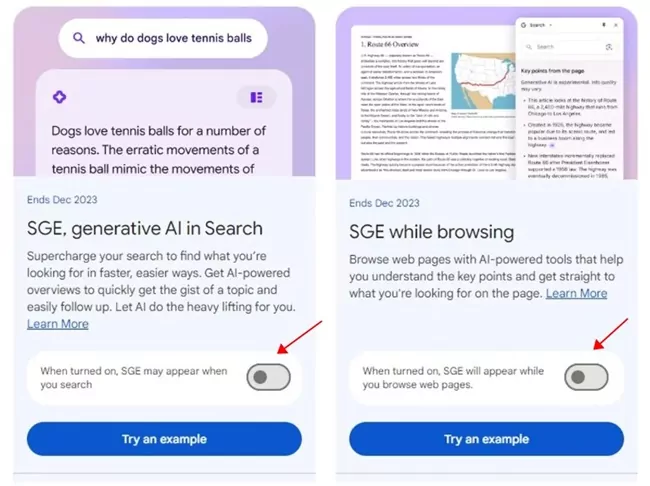How to Turn Off or On Google AI Overview: Using Tips for You

Table of Contents
In the fast-paced digital world, Google introduces Generative AI to revolutionize search. This technology provides dynamic, context-rich answers directly in search results, eliminating the need to sift through multiple links. Google’s aim is to enhance user experience by offering instant, accurate, and comprehensive responses.
This article will introduce the content of Google’s recent announcement of the introduction of generative artificial intelligence in search and the specific user-related usage matters.
What is Google Generative AI?
Google Generative AI is an advanced technology designed to revolutionize online search by generating detailed, contextually relevant responses. Powered by the Gemini AI model, it synthesizes information from multiple sources in real-time, providing users with comprehensive answers directly in the search results. Unlike traditional search engines that offer a list of links, Generative AI delivers immediate, accurate responses tailored to the user’s query, enhancing the efficiency and effectiveness of information retrieval. This innovation aims to make searching faster and more intuitive, offering a significant leap forward in the way users interact with search engines.
Key Feature of Google's AI Overview
Google’s AI Overview introduces several groundbreaking features that enhance search results and user experience. Each feature is designed to provide more precise, relevant, and timely information.
Real-Time Information Synthesis
Google’s AI Overview synthesizes real-time data to ensure that users receive the most current information available.
- Dynamic Updates: Continuously pulls and updates information from a variety of sources.
- Timeliness: Provides the latest data on topics, ensuring relevance and accuracy.
- User Relevance: Enhances the accuracy and utility of search results by adapting to new information as it becomes available.
Contextual Understanding
The AI Overview feature leverages advanced contextual understanding to provide more relevant answers.
- Deep Analysis: Analyzes the context of queries to deliver nuanced responses.
- Relevance: Ensures answers are tailored to the specific needs and context of the user’s search.
- Enhanced Satisfaction: Improves user satisfaction by providing more precise and relevant information.
Visual and Text Integration
AI Overview integrates both visual and textual information to enrich the search experience.
- Comprehensive Responses: Combines text and images to provide a fuller understanding of search topics.
- Visual Aid: Helps users grasp complex information quickly through visual representation.
- Enhanced Learning: Facilitates easier comprehension and retention of information.
How Does Generative AI in Google Search Work?
Generative AI in Google Search operates through a combination of advanced algorithms and real-time data processing. This synergy allows the AI Tool to provide highly accurate and contextually relevant responses to user queries.
Leveraging Machine Learning Models
Google’s Generative AI utilizes powerful machine learning models to identify patterns and trends in vast amounts of data. By analyzing these patterns, the AI can generate answers that are both accurate and contextually appropriate, offering users a more intuitive search experience.
Real-Time Data Processing
The core strength of Generative AI lies in its ability to process data in real time. This capability ensures that the information provided is always up-to-date and relevant to the user’s query. Real-time processing allows the AI to adapt to new data as it becomes available, providing users with the most current information possible.
How to Turn Off or On Google AI Overview
For users seeking to customize their search experience, Google provides straightforward steps to enable or disable the AI Overview.
Step 1: Access Google Chrome
Open Google Chrome and ensure you are logged into your Google account. This step is crucial as it sets the stage for accessing the Search Labs features.
Step 2: Navigate to Search Labs
Once on the Chrome homepage, locate the Search Labs icon at the top-right corner of the page. This icon is your gateway to managing Google’s experimental features.

Step 3: Toggle AI Overview Settings
Within the Search Labs menu, find the toggle switch for AI Overviews. Clicking this switch will either enable or disable the generative AI search results based on your preference.

Step 4: Adjust Code Tips
Additionally, you can manage the Code Tips feature within the same menu. Disabling this will prevent AI-generated coding suggestions, tailoring your search experience further.
Tips of Using Google AI Overview
To maximize the benefits of Google AI Overview, consider the following tips.
- Availability: Currently, Google AI Overview is available primarily in the United States and will expand to other countries gradually.
- User Age: Users must be 13 years or older to access this feature, ensuring compliance with international digital privacy laws.
- Supported Areas: Google AI Overview currently supports multiple languages, including English,Hindi,Indonesian,Japanese,Korean,Portuguese (Brazil),Spanish (Latin America).
Impact on Traditional Search Results
The integration of AI Overviews significantly impacts traditional search results, reshaping how users interact with search engines.
- Shift in Traffic Patterns: AI Overviews may lead to a shift in web traffic patterns, as users are provided with comprehensive answers directly within the search results. This could result in fewer clicks on traditional search links.
- Enhanced Search Efficiency: AI Overviews streamline the search process by offering immediate answers to complex queries, reducing the need for users to navigate multiple links. This enhances the overall efficiency and effectiveness of searches.
User Feedback and Privacy Concerns
The reception of AI Overviews among users has been mixed, reflecting both enthusiasm and concern.
Positive Reception
Many users have welcomed AI Overviews, appreciating the quick access to detailed information without needing to click through multiple links. This feature is particularly valued for its ability to simplify complex searches, making it easier for users to find relevant information quickly. The convenience and time-saving aspects are major advantages that enhance the overall user experience.
Privacy Issues
Despite the benefits, significant privacy concerns have been raised regarding the extensive data collection required for AI Overviews. Users are increasingly wary of how their search data is used and stored, prompting calls for greater transparency and data protection measures. These concerns highlight the need for Google to balance innovation with stringent privacy safeguards to maintain user trust and confidence.
Ethical Considerations
Beyond privacy, ethical concerns are also prominent. The reliance on AI to generate information raises questions about the accuracy and bias of the responses. Users are concerned about the potential for AI to spread misinformation or favor certain viewpoints. Additionally, there are worries about the impact on content creators, as AI-generated summaries might reduce traffic to original sources. These ethical issues necessitate careful consideration and responsible AI development from Google.
Google's Future Plans for AI in Search
Looking ahead, Google is committed to further integrating AI into its search functionalities. The company plans to refine and expand the capabilities of Generative AI, enhancing its contextual understanding and broadening its application across various Google platforms. By 2024, Google aims to make AI Overviews a standard feature globally, ensuring that users worldwide benefit from more efficient and contextually relevant search experiences. This future-focused approach underscores Google’s dedication to leveraging AI to improve user interactions and search outcomes.
Conclusion
Google’s integration of Generative AI into search is a major advancement, enhancing efficiency and user experience. While it brings significant benefits, it also raises privacy and ethical concerns that Google must address. Balancing innovation with user trust and data security is crucial as Google continues to refine and expand its AI capabilities. By fostering transparency and responsible AI development, Google aims to provide a cutting-edge yet trustworthy search experience.

